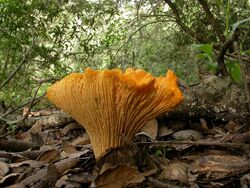Biology:Cantharellus californicus
| Cantharellus californicus | |
|---|---|

| |
| Scientific classification | |
| Domain: | Eukaryota |
| Kingdom: | Fungi |
| Division: | Basidiomycota |
| Class: | Agaricomycetes |
| Order: | Cantharellales |
| Family: | Cantharellaceae |
| Genus: | Cantharellus |
| Species: | C. californicus
|
| Binomial name | |
| Cantharellus californicus Arora & Dunham (2008)[1]
| |
| Cantharellus californicus | |
|---|---|
| Mycological characteristics | |
| ridges on hymenium | |
| cap is infundibuliform | |
| hymenium is decurrent | |
| stipe is bare | |
| spore print is yellow | |
| ecology is mycorrhizal | |
| edibility: choice | |
Cantharellus californicus, also called the California golden chanterelle,[2] mud puppy, or oak chanterelle, is a fungus native to California , United States.[3] It is a member of the genus Cantharellus along with other popular edible chanterelles. It is generally similar in appearance to C. cibarius and C. formosus except for its large size at maturity; individual specimens larger than 1 kilogram (2.2 lb), or greater (2 kilograms (4.4 lb)), are reported, making it the largest known species of chanterelle.[1] Their unusual size is due in part to their capacity for indeterminate growth, making Cantharellus californicus specimens actively grow for far longer than most other mushrooms.[4] It became the official state mushroom of California in 2024.[5]
Description
The pileus (cap) of C. californicus is 5–30 centimetres (2–12 in) wide,[6] or greater (50 cm (20 in)), and yellow-orange in color although adhering leaf litter may cause a mottled color; may become brownish with age. The hymenium is folded into decurrent ridges (false gills) and cross-veins, which deepen with age. The color of these ridges is usually similar to the pileus but paler. The stipe (stem) is 2–10 cm (0.8–4 in) long and 1–4 cm (0.39–1.57 in) wide,[6] with coloration similar to the hymenium.[1] The spores are creamy yellow, elliptical, and smooth.[6]
Distribution and habitat
Cantharellus californicus forms a mycorrhizal association with oaks, particularly coast live oak in the woodlands of Coastal California. It has also been found in association with interior live oak, California black oak, canyon live oak, tanoak, and possibly Pacific madrone and manzanita.[1] C. californicus is a popular wild edible in the San Francisco Bay Area, and is most common between November and April.[1][7]
Similar species
Several other species of chanterelle may be found in western North America:
- C. cascadensis[6] – bright yellow fading to white in center of cap, associated with conifers
- C. cibarius var. roseocanus[6] – false gills tend to be as dark or darker than cap
- C. formosus[6] – smaller size, narrower stem, associated with conifers
- C. subalbidus – whitish overall color
Additionally, Hygrophoropsis aurantiaca, Chroogomphus tomentosus, and species in the genera Craterellus, Gomphus, Omphalotus, and Polyozellus may have a somewhat similar appearance to C. californicus. Omphalotus olivascens, the western jack-o'-lantern mushroom, is poisonous and has been mistaken for chanterelles.
References
- ↑ 1.0 1.1 1.2 1.3 1.4 Arora, D.; Dunham, S. M. (2008), "A New, Commercially Valuable Chanterelle Species, Cantharellus californicus sp. nov., Associated with Live Oak in California, USA", Economic Botany 62 (3): 376–391, doi:10.1007/s12231-008-9042-7, http://www.davidarora.com/uploads/arora_dunham_chanterelles.pdf, retrieved 2010-09-12
- ↑ "California AB261 | 2023-2024 | Regular Session" (in en). https://legiscan.com/CA/text/AB261/id/2653093.
- ↑ Kuo, M. (February 2009), Cantharellus californicus, MushroomExpert.com, http://www.mushroomexpert.com/cantharellus_californicus.html, retrieved 13 September 2010
- ↑ Viess, Debbie, Cantharellus californicus: California's Giant, Oak-Loving Golden Chanterelle, Bay Area Mycological Society, http://www.bayareamushrooms.org/mushroommonth/chanterelle.html, retrieved 8 May 2011
- ↑ Stierch, Sarah (January 11, 2024). [ornias-new-state-mushroom-good-food-award-finalists-and-more-food-and-drink-tidbits/ "Mendocino Flavors: California’s new state mushroom, Good Food Award finalists, and more food and drink tidbits". The Mendocino Voice. https://mendovoice.com/2024/01/mendocino-flavors-calif[ornias-new-state-mushroom-good-food-award-finalists-and-more-food-and-drink-tidbits/. Retrieved January 11, 2024.
- ↑ 6.0 6.1 6.2 6.3 6.4 6.5 Davis, R. Michael; Sommer, Robert; Menge, John A. (2012). Field Guide to Mushrooms of Western North America. Berkeley: University of California Press. pp. 270–272. ISBN 978-0-520-95360-4. OCLC 797915861. https://www.worldcat.org/oclc/797915861.
- ↑ Perry, B. A. (December 2008), "An Old Friend Gets a New Name", Mycena News (Mycological Society of San Francisco), http://www.mykoweb.com/articles/OldFriendNewName.html, retrieved 13 September 2010
External links
Wikidata ☰ Q2936589 entry
 |


